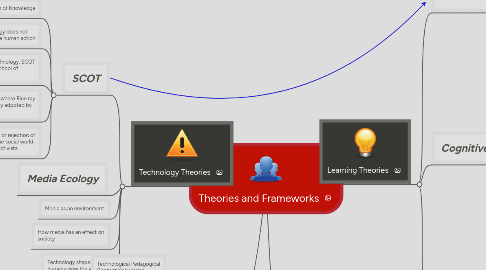
1. Technology Theories
1.1. SCOT
1.1.1. Social Construction of Knowledge
1.1.2. Technology does not determine human action
1.1.3. Human action shapes technology. SCOT draws on constructivist school of thought.
1.1.4. Example: Blue ray VS. HDDVD where Blue ray was the dominating technology adpoted by society and not HDDVD
1.1.5. To understand the acceptance or rejection of technology, we must look at the social world, thus it's connection to constructivists
1.2. Media Ecology
1.3. Media as an environment
1.4. How media has an effect on society
1.5. Technology shapes how humans view the world
1.6. Humans as affected by technology
2. TPACK
2.1. Technological Pedagogical Content Knowledge
2.2. Nature of knowledge of technology integration by teachers in their teaching style
2.3. Three primary forms of knowledge: Content, Pedagogy and Technology
2.4. http://martine-gordon.blogspot.com/2010/06/tpack.html
3. Learning Theories
3.1. Constructivist
3.1.1. Constructing our own understanding and knowledge of the world we live in
3.1.2. Learner brings from their own experience
3.1.3. Teacher is a facilitator who makes learning active
3.1.4. When connections are made (much like these tools) between two pieces of information, learning will occur and is built
3.2. Cognitive Load
3.2.1. Working memory and long term memory
3.2.2. Long term knowledge is stored in long term memory
3.2.3. Working memory takes information and turns it to long term memory where it is stored
3.2.4. Interruptions and distractions can impair learning in the classroom
3.2.5. Teachers should check for learning often and not give too much information at once. Overload may occur in learner.
3.3. Connectivism
3.3.1. Knowledge is external rather than focus on internal. Knowledge is in the world for the learner to obtain
3.3.2. Learning is active
3.3.3. Teacher gives students opportunities to make connections with knowledge
3.3.4. Nurturing and maintaining connections is needed to facilitate learning. Connection making provides far greater returns on effort than simply seeking to understand a single concept
